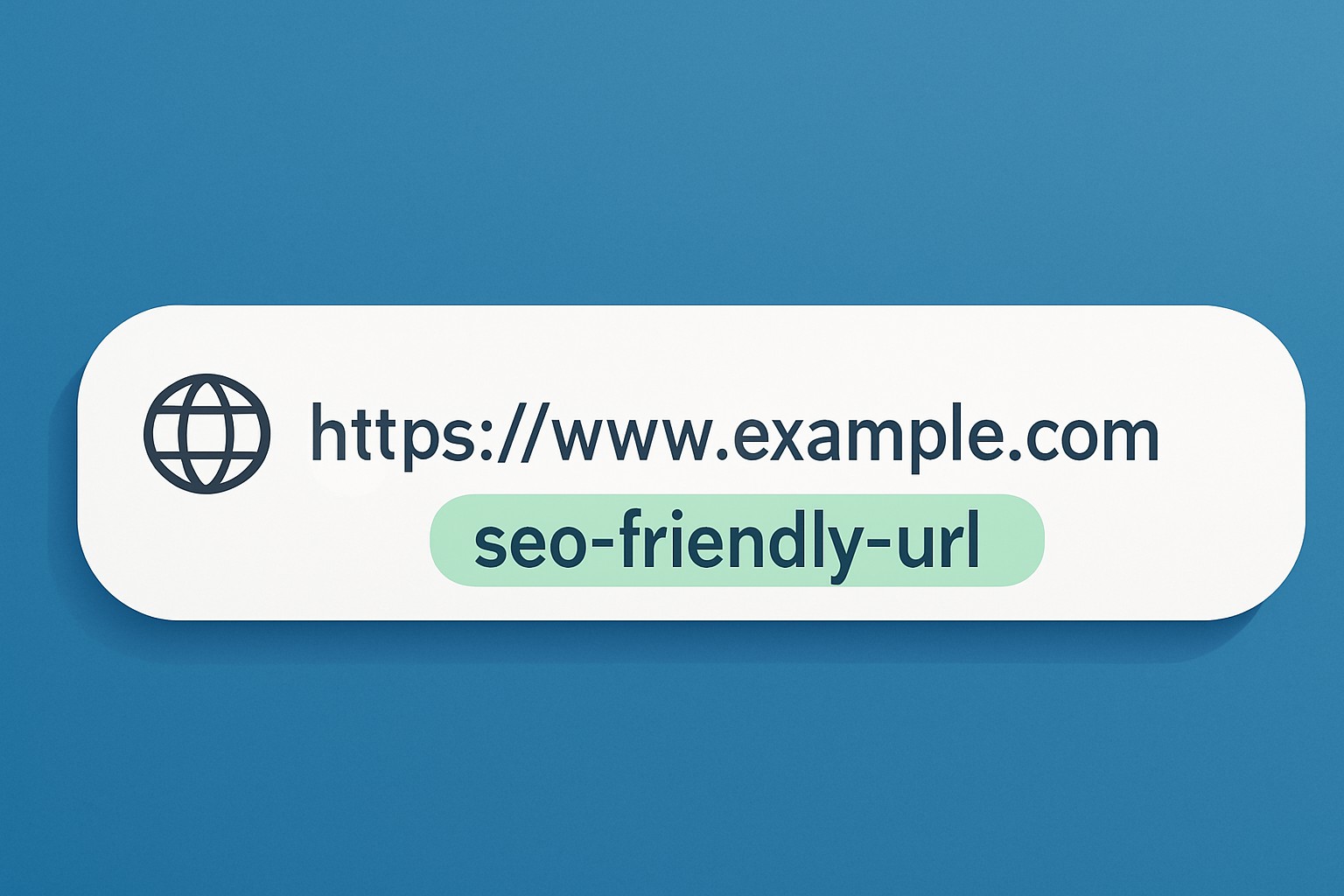SEO Friendly URL Optimization Guide


Optimizing URLs to be SEO friendly is a key step in boosting your website's visibility, making it a breeze for users to navigate.
What Really Makes a URL SEO Friendly
SEO friendly URLs are web addresses designed to be clear and easy on the eyes with relevant keywords. This little trick helps both search engines and visitors get the gist of the page quickly.
- They tend to be straightforward and clear, making life easier not just for people but for search engines too.
- SEO-friendly URLs usually pack in relevant keywords that really capture what the page is all about.
- URLs keep it simple and get straight to the point, steering clear of any needless complexity that might muddy the waters.
- Hyphens win the popularity contest when it comes to separating words, trumping underscores or spaces every time.
- Special characters and pointless parameters should be left out to keep things nice and tidy.
Advantages of Using SEO Friendly URLs
Using SEO friendly URLs comes with quite a few perks. They make life easier for users by clearing up navigation and help search engines do their job more smoothly. They often give click rates a nice nudge thanks to their straightforward keyword-packed links.
- Give your website’s rankings a gentle nudge by making it easier for search engines to figure out which pages are crucial.
- URLs become simpler to share and easier to remember, making the whole experience more user-friendly and inviting.
- Clear URLs boost crawlability, helping search engines to index your content more quickly and smoothly.
- Clean polished-looking links can really help build trust and credibility with your users, making them feel right at home.

Example of an SEO friendly URL displayed in a browser's address bar, illustrating clarity and keyword usage.
A Step-by-Step Guide to Crafting SEO-Friendly URLs That Actually Work
Creating SEO-friendly URLs calls for a clear-cut strategy that focuses on keywords and readability and keeping things simple.
Pick keywords that truly match what the page is about.
Keep your URLs short and simple, avoiding unnecessary fluff or strange symbols.
Use hyphens to separate words because search engines usually treat them like spaces which makes things clearer for everyone.
Skip common stop words like "and" or "but" and avoid special characters since they clutter URLs and add no value.
Stick to lowercase letters throughout to prevent duplicate content issues caused by case differences.
Place the main keyword near the start of the URL.
Make sure the URL accurately reflects the page’s content to build trust with visitors and keep search engines aligned.
Whenever you update URLs, always set up proper 301 redirects to protect your SEO and avoid broken links.
Frequent Mistakes to Watch Out for in URL Optimization (and How to Dodge Them Like a Pro)
Many SEO strategies tend to miss the mark thanks to common URL slip-ups that leave both search engines and visitors scratching their heads.
- Overloading URLs with too many dynamic parameters, which can quickly turn them into a tangled mess that’s confusing for both users and search engines to navigate.
- Cramming URLs full of too many or irrelevant keywords, a move that usually backfires by hurting readability and SEO rather than helping.
- Opting for underscores instead of hyphens to separate words, a bit of a faux pas since search engines tend to treat underscores as joined words rather than spaces.
- Making URLs excessively long, which not only makes them a pain to read but also tough to remember and share with others.
- Mixing uppercase and lowercase letters haphazardly, risking duplicate content headaches because URLs are case sensitive and picky that way.
- Forgetting to set up proper redirects when URLs change, leading to those dreaded broken links and lost traffic that nobody wants to deal with.
Tools and Resources That Can Really Give Your URLs a Boost
Using specialized SEO tools and plugins usually makes URL optimization much easier and more effective. These handy helpers analyze URL structure, spot important keywords and give your on-page SEO a good once-over to boost your results.
- URL structure analyzers take a close look at your URLs and measure them against SEO best practices. They highlight exactly where you could tweak things for the better. It’s like having a friendly guide pointing out spots to polish up.
- Keyword research tools such as Moz Pro or Mangools KWFinder are your go-to buddies for digging up golden keywords to weave into your URLs. This helps you catch the attention your site deserves.
- SEO audit software dives deep into your site to sniff out URL hiccups and broken links. It also finds other areas that might be holding you back from shining fully online.
- CMS plugins for URL rewriting come in clutch by automating the URL cleanup process. They make sure everything stays neat and consistent within platforms like WordPress without you lifting more than a finger.
How to Nail URL Optimization on Popular Platforms
Every web platform seems to juggle URL management in its own quirky way. Whether you’re tinkering with WordPress or navigating Shopify and a custom CMS, getting the hang of setting up your URLs can genuinely boost your SEO.
- In WordPress you can tweak your permalinks by heading over to Settings > Permalinks and picking options like "Post name" to craft URLs that work well with SEO. It is a simple move that pays off more often than not.
- Shopify has a few quirks with URL structures but allows you to edit handle names. Keeping your product and collection URLs clean and loaded with relevant keywords usually does the trick.
- When dealing with custom CMS platforms developers must set up URL routing using hyphens, lowercase letters and keywords that clearly shout what the page is about. It makes everyone's life easier honestly.
Keeping Your URLs SEO Friendly Over Time A Little TLC Goes a Long Way
Keeping your URLs in tip-top shape with SEO friendly URLs requires ongoing TLC. A regular once-over, timely updates and thoughtful redirect management work together to keep your site's SEO fire burning strong.
- Keep a regular watch on your website for broken links because they can quietly sabotage your SEO if left unchecked.
- When changing URLs, use 301 redirects carefully so you do not lose any of that hard-earned link juice.
- Review your URL structure frequently to keep it tidy and aligned with SEO best practices. Clean and simple usually wins the race.
- Treat URL updates like handling a delicate soufflé during site redesigns. One wrong move could make you lose traffic or rankings.
- Let search engines know about any URL changes by updating your sitemaps and making good use of Search Console tools.
Frequently Asked Questions
Why are hyphens better than underscores in SEO friendly URLs?
Search engines treat hyphens like little spaces which makes the words in your URL easier to read and understand. On the flip side, underscores tend to glue words together which can leave both users and search engines scratching their heads over what’s what.
How long should an SEO friendly URL be?
Aim to keep URLs around 50 to 60 characters or less—think of it like keeping things short and sweet. Shorter URLs are easier to share and remember and often perform better in search results too. In my experience clarity and relevance matter most so try to put your main keyword near the beginning where it can really shine.
Can changing my URLs hurt my SEO rankings?
Yes, if you swap URLs without setting up proper 301 redirects you’re basically inviting broken links and a dip in your rankings. Always make sure to put redirects in place to preserve your link juice and give search engines the heads-up through sitemaps or Search Console. It’s the best way to keep the damage to a minimum.
Do uppercase letters in URLs affect SEO?
Absolutely. URLs are case-sensitive so using uppercase letters can create confusion with duplicate content issues. For example, 'Example-Page' is treated differently than 'example-page'. Keeping everything lowercase is a simple habit that saves headaches and keeps your site consistent.
What tools can help me audit my existing URLs for SEO?
There are some great tools out there like Screaming Frog, Ahrefs and Google Search Console that can dive into your URL structure, pinpoint problems like broken links or duplicate content and offer helpful suggestions. If you’re on WordPress plugins like Yoast SEO provide handy real-time tips on URL best practices—kind of like having an SEO buddy in your corner.
How often should I review my URLs for SEO optimization?
It’s wise to audit your URLs every few months or whenever you make big site changes like redesigns or major content updates. Regular check-ins keep your URLs tidy relevant and aligned with the latest SEO standards which helps you avoid nasty surprises when it comes to rankings.
Further Reading
Unlock Digital Marketing Success with Moz
Struggling to optimize your online presence? Moz is the ultimate Internet Marketing solution, empowering businesses with powerful SEO tools, insightful analytics, and expert guidance. Elevate your digital strategies and outshine the competition.
- Boost organic traffic with data-driven SEO tactics
- Enhance content marketing with expert recommendations
- Gain a competitive edge with comprehensive link analysis








